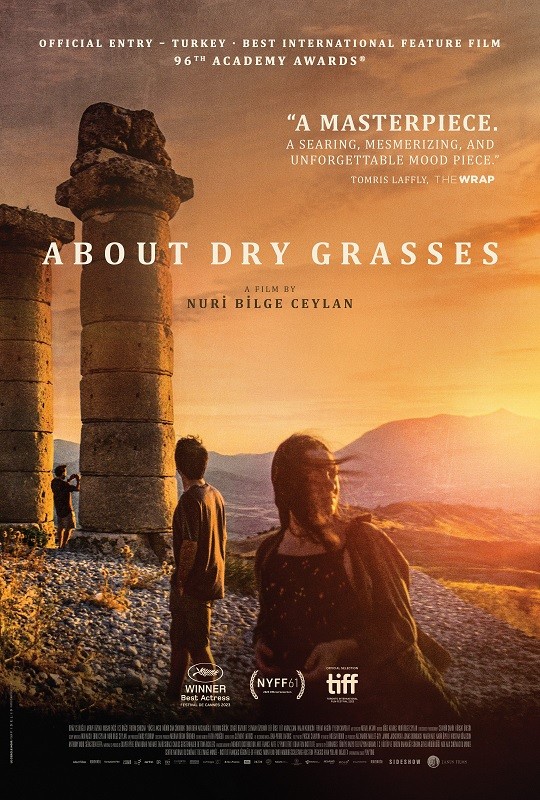About Dry Grasses
Introduction
I have really enjoyed the Foreign Language films shortlisted for the Academy Awards this year, so much so that I decided to slip in another film from the list with the exception being that it doesn’t feature in the Top 15 this year! With that, I finished watching the Turkish film About Dry Grasses which unfortunately failed to make it to the Top 15 at the Academy Awards this year under the foreign film category. The premise of it did not quite grab my attention as it ought to have, but a healthy letterboxd rating of 4(out of 5) did nudge me to give the film a shot. This was my first Nuri Bilge Ceylan film, a director that I had heard a lot of and I was quite curious to enter his world without quite knowing his style of narrative or what to expect from the film. So then does About Dry Grasses manage to impress, let’s find out.
Story & Screenplay
About Dry Grasses follows the story of a teacher whose hopes of migrating to Istanbul come crashing down after he is accused of inappropriate contact with a student. The story here might seem like a tale of the repercussions for the teacher accused of misconduct but instead, it is complex, philosophical and layered in its storytelling. In fact, despite the hooks in the screenplay, this is a fascinating character study of a flawed individual who is a narcissist and egoistic while being completely stuck in life, and being uncertain of his future. The screenplsy standing at a whopping runtime of more than 3 hours is a slow burn, taking its time to build and build(and a little more) until it embraces you in a telling final act which is philosophical, poetic and quite the epitome of a ruminated drama.
The drama opens with a figure braving his way through the snow and it is early on where the harsh landscape is tactfully introduced as a character. The beginning symbolises a tone of estrangement and loneliness associated with the drama featuring the protagonist who wishes to get transferred to Istanbul while serving his fourth term in a town named Anatolia. He is shown to be a kind teacher who is unlike the ones around him while he takes a liking towards one of his students with whom he shares a flirtatious banter every now and then with the occasional hand over her shoulder, mostly in jest. It is said that following the loss of his loved one, he hasn’t allowed anyone close to him but is often resorting to validation which for him comes in the form of his student. This is also to do with the fact that he is balding while wishing to massage his ego in front of his younger and more better looking flatmate in a underlying layer of one-upmanship. The twist in the tale occurs when both he and his roomate are accused of inappropriate behavior.
There are so many layers to be discovered here – for instance, the protagonist almost being embarrased when a member of the staff discovers a love letter from the bag of his student while assuming that the letter was for him(in a scene you see his student talking with another boy that raises this doubt). On being asked by his student to return his letter, he conveniently lies that he has destroyed it to protect her vested interests, something that she clearly sees through him while turning the love for her into rage, thus prompting her to lay severe charges against him. Now, what could easily have been a psychological drama after this point, soon turns towards a different plot point, where a disturbed protagonist befriends a young teacher from a nearby school. He initially takes a disliking to her mainly because of her limp, while being eager to set things between her and his roomate, the entire incident of him being accused makes him turn towards her for validation.
The proceedings are meditative and poetic while highlighting the fact that the protagonist is selfish and insecure in many ways wherein his this very trait is put to test when the young teacher forms a liking towards his better looking roommate. And thus, he decides to get closer to her in a terrific scene that begins with a discussion of varied school of thoughts regarding man and his existence while defining the concept of a hero. These discussions notwithstanding, the protagonist and the duo get intimate for the first time. But if I were to change the point of view here, the young teacher also had vested interests in wishing to explore her ‘power’ in the real world following the loss of her leg in a suicide bombing. Thus, both the young teacher and the student used the narcissistic trait of the protagonist to find a way around him, something that was oblivious to him.
The final act though is terrific while completely changing the dynamics of the drama which is in sync with the changing season. In another brilliant scene, the protagonist is seen wandering while being poignant about two seasons of the town – winter and summer. And while winters were harsh with snow all around, summers too did not fruitful with the terrain being home to dry grasses, a montage for the title. This was a more philosophical take on the deserts being piled up within an individual with most things in life, even significant at the time amounting to nothing at the end. This was more of the mid-life crisis where the protagonist finds himself in, estranged and lonely in life while mildly being envious of his young student who has a whole life in front of her, and also coming to terms with the fact that the young teacher is fond of his roommate more than him. He is all set to be alone again with his virtue of seeking for validation dried out, much like the grass in summers. The screenplay is engrossing, unique and extremely philosophical in nature.
Dialogues, Music & Direction
The dialogues are conversational while touching upon so many aspects of life from God to the creation of man and the concept of hero in today’s times. The range of conversations could be summed up as a catharsis of sorts while highlighting the existential crisis of humanity. The lines add a lot of depth to the drama while slowly indulging you in the conversations. The BGM is sparingly used while never overpowering or interfering with the tone of the drama. The cinematography has spectacular wide shots depicting the two seasons, while also doubling up with tight frames that help you understand the psyche of characters so well. The frames also help you in investing in the conversations throughout the narrative. The editing doesn’t interfere with the flow of the drama while allowing the conversations to play out in several scenes which are pretty long in length. Director Nuri Bilge Ceylan has masterfully crafted conversations here that add a whole new dimension to the drama. The plot here is also character driven and he does etch out such raw and flawed characters that make for an absorbing drama. Yet, the director purposely allows the drama to linger on while being mindful of its philosophical undertones that surprisingly don’t weigh the drama down. The direction is exceptional here in every sense of the word.
Performances
The performances are spectacular here by the ensemble cast. Ece Bagci as Sevim is a phenomenal actor at such a young age. Her body language and mannerisms are deceptive but so beautifully represent the crux of her character. There is so much more to her than what meets the eye. Musab Ekici as Kenan is wonderfully restrained in a character who is quite oblivious of the motives of the protagonist as far as his dynamics with the young teacher is concerned. Merve Dizdar as Nuray is brilliant to the core in a character fighting her own set of battles. Her vulnerability and insecurity is beautifully represented in an emotional outburst that culminates into an erotic end while never straying from the purpose of her character coming in terms with ‘her’ reality. The pain on her face was reminiscent of her past and the baggage that she had been carrying. Deniz Celiloglu as Samet is such a layered character with conflicting motivations that you never fully end up liking him nor hating him. And to achieve this razor sharp balance was no mean feat in what was a supremely towering act by him.
Conclusion
Turkey’s Official Entry to the Academy Awards this year(not shortlisted in the Top 15), About Dry Grasses is a languid rumination of estrangement and loneliness packaged in a philophical musing that makes for a brilliantly poignant watch.




